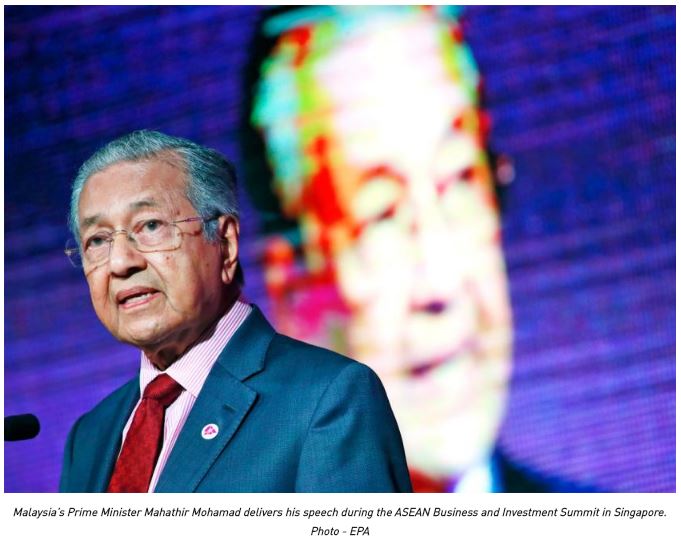Malaysian PM stresses need for economic cooperation in ASEAN
Leaders across Asia Pacific, including Myanmar, discussed at length the need for greater ASEAN solidarity and cooperation to withstand global protectionist policies on Monday and Tuesday in Singapore, as trade tensions brew between the US and China.
Speaking to reporters at the sidelines of the 33rd Association of Southeast Asian Nations (ASEAN) Summit and Related Meetings yesterday, Malaysian Prime Minister Tun Dr Mahathir Mohamad, voiced his disapproval of the use of sanctions to punish weaker economies, saying there are other ways to secure compliance.
“Sometimes even innocent countries pay the price because when you apply sanctions to any country, other innocent countries are prevented from doing business with them. Using economic pressure to cow people is very bad. People should be free to trade. If you want to punish someone, find ways which do not affect other people,” Dr Mahathir said.
His remarks come after the European Union this month removed Cambodia’s special trade access to punish Phnom Penh for alleged human rights abuses. Brussels is now considering doing the same to Myanmar for its handling of the Rakhine refugee crisis. A plethora of European and Myanmar trade groups have come out against the possible sanction.
The Malaysian prime minister, who strongly condemned the crisis in Rakhine, nevertheless stressed the importance of forging strong ties between ASEAN member states as well as other Asia Pacific economies under the Regional Comprehensive Economic Partnership (RCEP).
“Some 65 percent of ASEAN’s trade is with RCEP countries. We must therefore leverage the existing high level of trade ties. We must not just accept trade and investment measures that may be unfair to ASEAN nations and ASEAN economic integration,” Dr Mahathir said.
‘Using economic pressure to cow people is very bad. People should be free to trade.’ – Tun Dr Mahathir Mohamad, Malaysia’s Prime Minister
The leader also added that “trade tensions between [China] and [the US] are bound to create a domino effect that will impact trade relations and will be a reason for other developed countries to adopt protective measures against developing countries, including ASEAN countries.”
Referring multiple times to the increasing use of protectionist policies in other regions and the need to be prepared for its repercussions, ministers from 16 countries intensified talks to reach an agreement on key parts of the RCEP, the free-trade pact involving all 10 ASEAN member countries and six other Asia Pacific countries including Japan, China and India. When signed, the RCEP will rival the EU as the world’s largest economic bloc.
“ASEAN’s own agenda must aim to boost intra-regional trade from the current level that has been stagnant at around 25pc, to over 30pc,” Dr Mahathir said. “Raising intra-regional trade does not mean ASEAN is inward-looking but rather opening up opportunities for SMEs [small and medium-sized enterprises] as well as exploring new possibilities.”
He added the target “can be realised as we can see that intra-regional investments are growing. From 5pc some 20 years ago, intra-regional investment is now close to 20pc. This shows great promise and it must be capitalised to benefit ASEAN SMEs.”
On Monday, State Counsellor Daw Aung San Suu Kyi invited members of ASEAN to invest in Myanmar, particularly the agricultural and industrial sectors, which will also advance the skills and knowledge of the Myanmar people.
The State Counsellor highlighted recent reforms and legislation that have helped to make Myanmar a much easier country in which to do business, and promised further policies that will ensure a stable investment environment for investors over the long term.
“For Myanmar, ASEAN plays an important role. As of September, investments from ASEAN comprise 45pc of total approved investments in Myanmar, demonstrating the strong economic ties between our country and the region. We would like these ties to become stronger,” Daw Aung San Suu Kyi said.
Source: https://www.mmtimes.com/news/malaysian-pm-stresses-need-economic-cooperation-asean.html


 Thailand
Thailand




